Report: Physician payments should be tied to inflation-based index
To support congressional action, 135 health organizations – including the American Academy of Ophthalmology – sent a letter to congressional leaders pointing out that a full inflation-based update is the primary solution to the ongoing problem with the Medicare Physician Fee Schedule.
Organizations, including the American Academy of Ophthalmology, urge Congress to take action to address these systemic problems with the Medicare physician payment system by passing legislation providing physicians with an annual inflation-based update tied to the MEI. (Adobe Stock image)

In a recent report, the Medicare Payment Advisory Commission (MedPAC), an independent advisory agency, recommended that physician payments should be updated by tying them to 50% of the Medicare Economic Index (MEI), essentially adjusting payments for inflation.
MedPAC also recommended add-on payments of 15% for primary care physicians treating low-income beneficiaries, and 5% for non primary-care physicians.
“For calendar year 2024, the Congress should update the 2023 Medicare base payment rate for physician and other health professional services by 50% of the projected increase in the Medicare Economic Index,” the commission wrote, approving the recommendation by a 17-0 vote.
According to the report, Medicare payments have not kept up with inflation, resulting in the equivalent of a double-digit decrease for physicians since 2001, and payments were reduced 2% in 2022. With costs increasing and payments decreasing, physicians have often struggled to keep their practices open, particularly in rural and underserved areas.
“Having surveyed the health care landscape, MedPAC recognized that physician pay has not kept up with the cost of practicing medicine,” American Medical Association President Jack Resneck Jr., MD, said in a statement. “Yet, we feel strongly that an update tied to just 50% of MEI will cause physician payment to chronically fall even further behind increases in the cost of providing care. Congress should adopt a 2024 Medicare payment update that recognizes the full inflationary growth in health care costs.”
Resneck noted that as one of the only Medicare providers without an inflationary payment update, physicians have waited a long time for this change.
“When adjusted for inflation, Medicare physician payment has effectively declined 26% from 2001 to 2023,” he said in a news release. “These increasingly thin or negative operating margins disproportionately affect small, independent, and rural physician practices, as well as those treating low-income or other historically minoritized or marginalized patient communities. Our workforce is at risk just when the health of the nation depends on preserving access to care.”
Moreover, Anders Gilberg, Medical Group Management Association senior vice president, government affairs, also said the recommended increase doesn’t go far enough, pointing out that it would amount to a 1.45% increase for 2024.
“In the best of times such a nominal increase would not cover annual medical practice cost increases,” Gilberg said in a statement. “In the current inflationary environment, it is grossly insufficient.”
He added that an update of any amount less than the full MEI will not adequately remedy the negative impact of the broader economy on practices’ financial stability.
According to the AMA, when adjusted for inflation, Medicare physician payment has effectively declined 26% from 2001 to 2023. These increasingly thin or negative operating margins disproportionately affect small, independent, and rural physician practices, as well as those treating low-income or other historically minoritized or marginalized patient communities.
To support Congressional action, 135 health organizations – including the American Academy of Ophthalmology – representing 900,000 physicians, sent a letter to congressional leaders telling them that a full inflation-based update is the primary solution to the ongoing problem with the Medicare Physician Fee Schedule.
The letter notes that Congress has passed stopgap measures in the past few years to mitigate threats to Medicare physician payments, yet practice costs have outpaced those efforts. The gap between frozen physician payment rates and rising medical practice costs due to inflation will continue to widen. A permanent solution is needed to avoid this annual panic and legislative chaos.
The letter points out the real-life impact of the eroding value of Medicare payments. According to MedPAC, among those looking for a new primary care physician, half of Medicare patients had difficulty in finding one. And among Medicare patients looking for a new specialist, one-third struggled to find one. Finding specialists in rural and historically underserved areas is particularly difficult, and the payment system is creating even bigger barriers for patients in those communities.
“We urge Congress to take action to address these systemic problems with the Medicare physician payment system by passing legislation providing physicians with an annual inflation-based update tied to the MEI,” the organizations concluded in the letter. “Congress has a real opportunity to relieve the financial strain on Medicare physicians and strengthen access to care for current and future generations of Medicare beneficiaries. We urge you to answer that call.”